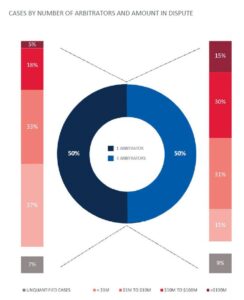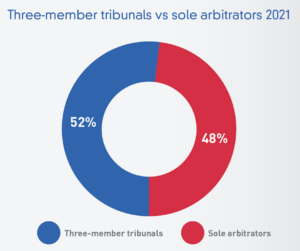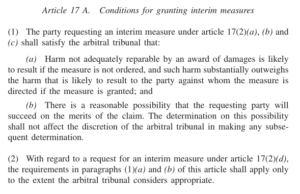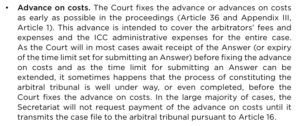Parties wishing to initiate arbitration often have two key concerns in addition to whether a case has merit: the costs and duration of the proceedings. These concerns were recently addressed by the London Court of International Arbitration (the “LCIA”) in a report published on 30 December 2024, entitled “Facts and Figures – Cost and Duration: […]
LCIA Arbitration
Summary Procedures in International Arbitration
Summary procedures in international arbitration mean procedures by which the arbitral tribunal determines certain points of fact or law at an early stage of the proceedings, potentially dispensing with the need for further arbitration proceedings. Summary proceedings can be a blessing to a respondent facing frivolous claims that obviously lack merit, as a successful dismissal […]
The Choice Between One and Three Arbitrators
The choice between one and three arbitrators is an important decision parties do not always pay attention to when drafting arbitration clauses, or even once a dispute has arisen. The choice of who will sit on the panel, including whether it will be a sole arbitrator or a three-member tribunal, is one of the most […]
The Costs of Arbitration
One of the most common questions claimants have prior to starting arbitration proceedings are the costs of arbitration, whether they can be estimated in advance, and how they can be reduced. The costs of arbitration, in addition to an arbitration’s duration, are an important if not determinative factor in a claimant’s decision whether to start […]
Provisional Measures in International Arbitration
Provisional measures can be an effective instrument to protect parties’ rights in arbitration. Although there is no widely accepted definition, provisional measures are, in general terms, remedies or relief whose purpose is to safeguard parties’ rights. In international arbitration, institutional rules are generally silent as to the standards and principles for the granting of provisional […]
The Timing of Payment of Arbitration Advances on Costs
The payment of advances on costs in arbitration aims to ensure that an arbitral institution has sufficient funds to cover the payment of arbitrators’ fees and expenses, as well as costs incurred in the administration of arbitral proceedings. The advances on costs paid to arbitral institutions do not include party costs, such as legal fees […]
Drafting an Arbitration Clause in 2021 – Recommendations
Many parties fail to realize that the wording of an arbitration clause is important for arbitration to function smoothly. In practice, one may observe, however, recurrent scenarios where arbitration clauses contain defective wording and, thus, are subject to unnecessary incidents and procedural debates. Such clauses are called “pathological clauses“. They are defined in Fouchard, Gaillard, […]
Rome I, Rome II, Applicable Law and International Arbitration
The relevance of the Rome I and Rome II Regulations for determining the law applicable to the merits of an international arbitration is a hotly-debated issue. Within the European Union (“EU”), Regulation (EC) No. 593/2008 on the law applicable to contractual obligations (“Rome I”)[1] and Regulation (EC) No. 864/2007 on the law applicable to non-contractual […]
Initiating Arbitrations Under Multiple Arbitration Agreements
The filing of arbitrations based on multiple arbitration agreements, contained in two (or more) separate contracts, in a single arbitration proceeding may be possible, but must be done with caution. The development of major projects in the fields of engineering, construction, oil and gas, and mining often give rise to situations where related disputes regarding […]








